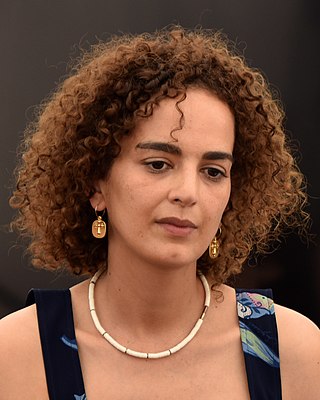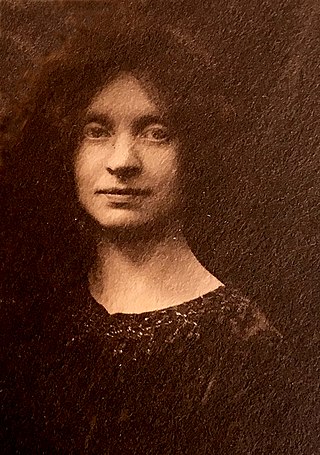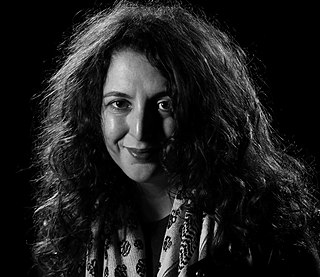Related Research Articles

MoulayYusef ben Hassan, born in Meknes on 1882 and died in Fes in 1927, was the 'Alawi sultan of Morocco from 1912 to 1927. He was the son of Hassan I of Morocco, who was the son of Muhammad IV of Morocco.

Andrée Chedid, born Andrée Saab Khoury, was an Egyptian-French poet and novelist of Syrian/Lebanese descent. She is the recipient of numerous literary awards and was made a Grand Officer of the French Legion of Honour in 2009.
Marie-Jeanne Riccoboni, whose maiden name was Laboras de Mézières, was a French actress and novelist.

Jocelyne François is a French writer. She is the author of five lesbian novels, and winner of the Prix Femina.

Hélène Ségara, born Hélène Aurore Alice Rizzo on 26 February 1971, is a French singer of Armenian and Italian descent, who came to prominence playing the role of Esmeralda in the French musical Notre Dame de Paris. She has sold over 10 million records.
Annette Mbaye d’Erneville is a Senegalese writer. She is the mother of filmmaker Ousmane William Mbaye, and was the subject of his 2008 documentary film, Mère-Bi.
Rajae Benchemsi is a Moroccan writer. Benchemsi studied literature in Paris and wrote her thesis on Maurice Blanchot. She has published collections of poetry in Morocco and in France Fracture du désir, a collection of articles published by Actes Sud in 1998. In 2006, she wrote 'Houda et Taqi'. Rajae Benchemsi is also the host of a Moroccan television program on books.

La Boîte à merveilles is an autobiographical 1954 novel by Moroccan writer Ahmed Sefrioui.
Rita El Khayat also known as "Ghita". Ghita El Khayat,, is Moroccan psychiatrist, anthro-psychoanalyst, writer, and anthropologist. She studied at modern schools of Rabat and completed her graduation in the field of Psychiatry, Psychoanalyst and Medical Aerospace from Paris whereas graduation in Ergonomics and Occupational Medicine were completed from Bordeaux. She did her PhD in Anthropology of Arab World from.

Éliette Abécassis is a French writer of Moroccan-Jewish descent. She is a professor of philosophy at the University of Caen Normandy.
Sirah Baldé de Labé (1929–2018) was a Guinean novelist and teacher.
Ina Césaire is a French playwright and ethnographer. In her 1981 article "Littérature orale et contes", "she discusses how Caribbean story tales are true 'révélateur' of that [Caribbean] spirit and affirms that the role of Caribbean folktale is to represent the culture."

Samia Benameur, better known by her pseudonym, Maïssa Bey, is an Algerian educator and writer.

Yamina Méchakra was an Algerian novelist and psychiatrist.
Suzanne Césaire, born in Martinique, an overseas department of France, was a French writer, teacher, scholar, anti-colonial and feminist activist, and Surrealist. Her husband until 1947 was the poet and politician Aimé Césaire.
For the Algerian novelist, see Mohamed Kacimi.

Leïla Slimani is a Franco-Moroccan writer and journalist. She is also a French diplomat in her capacity as the personal representative of the French president Emmanuel Macron to the Organisation internationale de la Francophonie. In 2016 she was awarded the Prix Goncourt for her novel Chanson douce.
Marie-Claire-Eléonore-Débochère Matip is a Cameroonian writer living in Paris. Her autobiographical novel Ngonda, published in 1958, is one of the first French-language texts to be published by a sub-Saharan African woman.

Aline Réveillaud de Lens, was a French novelist and painter who lived and worked in Tunisia and Morocco. She signed her works A. R. de Lens, A.-R. de Lens and Aline de Lens.

Sonia Terrab is a Moroccan writer, filmmaker, and activist. Her work revolves around the status of women in Moroccan society, social hypocrisy regarding the body and sexuality, and Moroccan youth.
References
- 1 2 3 4 5 6 7 8 "Touria Oulehri, une romancière "habitée" par la condition de la femme !". Africa Lifestyles (in French). 30 December 2019. Archived from the original on 16 April 2021. Retrieved 16 April 2021.
- 1 2 3 "Journée Internationale de la femme". Maghress (in French). 7 March 2008. Retrieved 22 March 2024.
- 1 2 Oliveras, Carlota. "Touria Oulehri. La répudiée". Center Dona i Literatura (in Spanish). Universitat de Barcelona. Archived from the original on 23 September 2006.
- 1 2 3 Khannous, Touria (2014). "Chapter 4. Writing in the Feminine: The Emerging Voices of Francophone Moroccan Women Writers". In Bratt, Kirstin Ruth; Elbousty, Youness M.; Stewart, Devin (eds.). Vitality And Dynamism: Interstitial Dialogues of Language, Politics, and Religion in Morocco's Literary Tradition (1st ed.). Amsterdam University Press. ISBN 9789087282134 . Retrieved 23 March 2024.
- ↑ Orlando, Valérie K. (September 2013). "Being-in-the-world: the Afropolitan Moroccan author's worldview in the new millennium". Journal of African Cultural Studies. 25 (3): 275–291. Retrieved 23 March 2024.
- ↑ Belarbi, Mokhtar (3 March 2011). "Métamorphoses du corps féminin dans la littérature marocaine et japonaise". Sens Public (in French). Retrieved 22 March 2024.
- ↑ Zoulagh, Latifa (2019). "Touria Oulehri: Du corps morcelé au corps reconstruit". Women in French Studies (in French). 27: 62–74. doi:10.1353/wfs.2019.0020 . Retrieved 23 March 2024.
- ↑ Segarra, Marta (2010). Nouvelles romancières francophones du Maghreb (in French). Karthala Editions. pp. 98–100. ISBN 9782811103224 . Retrieved 23 March 2024.
- ↑ "Ces artistes marocaines qui brillent par leurs talents". Libération (in French). 7 March 2020. Retrieved 23 March 2024.
- ↑ El Kourri, Rachid (2018). "Le roman féminin au Maroc : un itinéraire de combattantes". Faits de Langue et société (in French) (3–4): 140. Retrieved 23 March 2024.
- ↑ Orlando, Valérie K. (2009). "La Littérature-monde in the 'New Morocco': literary humanism for a global age". International Journal of Francophone Studies. 12 (2/3): 368. Retrieved 23 March 2024.
- ↑ Touaf, Larbi; Boutkhil, Soumia (26 March 2009). The World as a Global Agora: Critical Perspectives on Public Space. Cambridge Scholars Publishing. pp. 88–102. ISBN 978-1-4438-0728-9.